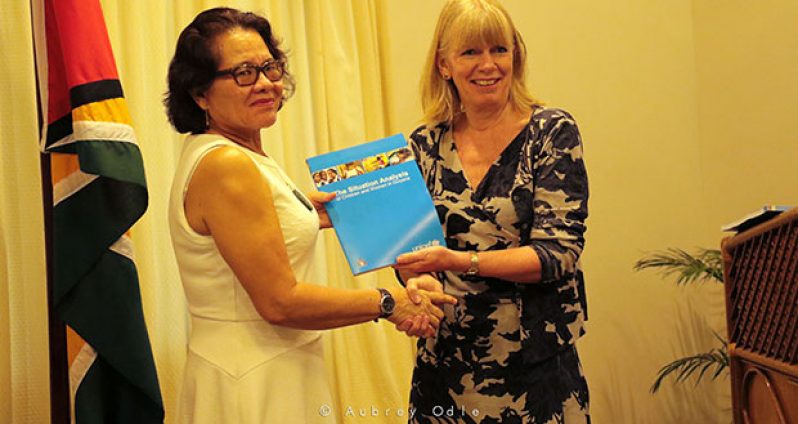– UN Children’s Fund urges equitable, measurable budgeting
By Shauna Jemmott
UNITED Nations Children’s Fund (UNICEF) Guyana Representative, Ms. Marianne Flach said the international organisation will push for equitable and measurable budgeting, which will ensure that the lives of Guyana’s children are improved, even as government builds its platform on sustainable development.Delivering an address at a ceremony for the handing over to Guyana, the first ever Guyana ‘Situation Analysis (SitAn) of Children and Women’ done by the UNICEF, Flach said the key to a sustainable future lies in government’s investment in its human resource.
UNICEF Monitoring and &Evaluation Specialist, Michael Gillis in his welcoming remarks said it is the first time the organisation had launched a situation analysis in Guyana, a document which gives a “very true picture” of situations faced by our women and children in Guyana. He said this is the global season when “data has become our way of life”, telling our stories and being taken as the “rule by which we play”.
Meanwhile, Flach told the gathering, which included First Lady Sandra Granger and Minister of Social Protection Volda Lawrence, the Analysis document will enable government to better understand issues that affect children throughout the country, and guide stakeholders to effectively implement programs and cater for their development in budget allocations.
“Investing in a country’s human capital is the key to a sustainable future. Before, our concern was quantity (how much is spent on children and on what), now our concern is also quality (how well the money is spent and to what extent it produces results for children). UNICEF encourages and stands ready to support the Government of Guyana, to ensure equitable and measurable budgeting for children,” Flach said.
Recent data gathered for the SitAn highlights different groups of vulnerable children and women, and has inspired UNICEF in highlighting and addressing critical areas in the design of its new Country Programme.
“UNICEF will also support efforts to increase children’s access to the justice system, in particular, developing and implementing targeted prevention programmes for juveniles considered at risk of being in contact with the law. We will also support the alignment of juvenile justice procedures with international standards,” Flach revealed.
She said too that the programme also considers education, early childhood development and the effects of climate change as vital areas of focus. “… particularly the provision of equitable and inclusive early childhood services… We will also continue to advocate for positive discipline and inclusive education for all children and adolescents… Climate change is also mainstreamed in our new country programme, with emphasis on Climate Change Education, and addressing issues such as the availability of clean water, and mitigating health risks…”
Health risks posed by infectious vector borne diseases such as Dengue, Chikungunya and Zika – which results in serious implications for pregnant women and their babies – to be addressed, Flach said. Flach disclosed that the UNICEF Country Programme for Guyana for 2017-2021 considers ‘Safety and Justice,’ ‘Life-long learning,’ and ‘Social inclusion and child rights monitoring’ as priority areas to be addressed, and will partner with Government over the next five years to support the country’s National Strategic Plans and Programmes, with emphasis on equity, and on reaching the most vulnerable children and families.
“For instance, we will scale up our focus on Child Protection, to ensure that violence, abuse and neglect of children is sufficiently addressed, by promoting a multi-sectoral approach to violence prevention, and strengthening child protection systems. Particular attention will be given to children with disabilities and children from indigenous groups.”
She said the organisation engaged the extractive sector earlier this year during a conference on child rights and business and as a result will create partnership with extractive businesses in addressing child protection. “We will look at creating partnerships with extractive businesses, as they are key stakeholders in addressing issues such as child protection, and can also play an important role in addressing environmental issues such as Mercury contamination which affect children more severely than adults,” Flach pointed out.
She said the allocation of resources to all sectors will ensure sufficient, equitable and efficient investment in children which is “crucial for the full realisation of children’s civil, political, economic, social and cultural rights.” She said only last week in Geneva, the Committee on the Rights of the Child launched General Comment 19 on “Public budgeting for the realisation of children’s rights,” which clearly sets out the obligations for Member States to properly budget and manage expenditures to realise children’s rights.
According to Flach, UNICEF is committed to “ensuring that all children can grow up safe, healthy, and have every opportunity to reach their full potential and contribute to the sustainable development of their communities, their nation and their world.”




.png)









